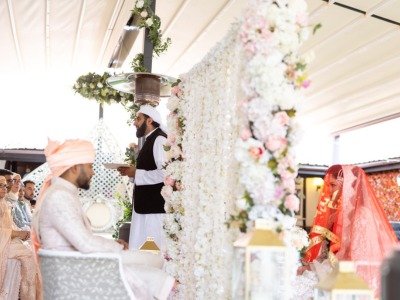Court Marriage in Pakistan – Fee & Process of Court Marriage in Pakistan
Court Marriage in Pakistan is an increasingly popular choice for couples seeking a legally recognized way to solemnize their union. Court marriage is a simple, efficient, and secure alternative. Whether for reasons of convenience, privacy, or personal choice, court marriage provides a lawful framework that ensures the state recognizes the union. Here, we’ll walk you through the fee and process of court marriage in Pakistan, highlighting everything you need to know.
Court Marriage in Pakistan and Its Fee & Process
Court marriage in Pakistan: With the complexities of societal expectations and traditional wedding arrangements, many individuals find court marriage to be a simple, efficient, and secure alternative. Whether for reasons of convenience, privacy, or personal choice, court marriage provides a lawful framework that ensures the state recognizes the union. Here, we’ll walk you through the fee and process of court marriage in Pakistan, highlighting everything you need to know.
Understanding Court Marriage in Pakistan
Court marriage is a legally binding process conducted under the laws of Pakistan. It allows couples to marry with mutual consent without the need for elaborate ceremonies. This method ensures that the marriage is documented and certified, offering both parties legal protection and rights. Court marriage is especially beneficial for individuals facing family opposition, interfaith unions, or time constraints.
The Step-by-Step Process of Court Marriage in Pakistan
-
Legal Consultation
The first step involves consulting an experienced lawyer to understand the legal requirements and ensure the process aligns with the laws governing marriage in Pakistan. -
Document Preparation
Essential documents include CNICs (Computerized National Identity Cards), passport-sized photographs, and affidavits confirming the free will of the couple. Additional documents may be required based on individual circumstances. -
Affidavits and Witness Statements
Both individuals must provide affidavits affirming their intent to marry. Witnesses are also required to validate the process. -
Registration and Nikahnama
The marriage is solemnized and documented in the Nikahnama (Marriage Contract), which serves as proof of the union. -
Court Attestation
The marriage is then presented before the magistrate or relevant authorities for official attestation, ensuring it is legally binding.
Court Marriage Fee in Pakistan
The fee for court marriage in Pakistan can vary depending on the city, the lawyer’s expertise, and the additional services required. Generally, it includes charges for legal consultation, document preparation, affidavits, and court attestation. In major cities like Karachi, Lahore, Islamabad, Rawalpindi, Multan, and Faisalabad, fees may differ due to regional factors. However, court marriage remains an affordable and cost-effective option compared to traditional weddings.
Why Choose Court Marriage in Pakistan?
-
Convenience and Simplicity
Court marriage eliminates the need for elaborate arrangements, allowing couples to focus on the essentials. -
Privacy and Discretion
For individuals valuing confidentiality, court marriage ensures a discreet process handled professionally. -
Legal Protection
The process guarantees that the marriage is recognized by law, safeguarding the rights of both parties. -
Accessibility Across Pakistan
With our experienced court marriage lawyers in Karachi, Lahore, Islamabad, Rawalpindi, Multan, and Faisalabad, couples can access legal services tailored to their specific needs.
How We Can Help with Court Marriage in Pakistan
Our team of experienced lawyers specializes in guiding couples through the court marriage process in Pakistan, ensuring a smooth and hassle-free experience. From document preparation to legal representation, we handle every aspect with professionalism and care. With offices in Karachi, Lahore, Islamabad, Rawalpindi, Multan, and Faisalabad, we are dedicated to providing accessible and reliable services to couples nationwide.
Contact us today to learn more about the fee and process of court marriage in Pakistan, and let us help you begin your marital journey with confidence and peace of mind.
Legalities and Requirements of Love Marriage/Court Marriage
In Pakistan, love marriages or court marriages are governed by specific legal provisions. The law recognizes the right of individuals to marry the person of their choice, irrespective of caste, creed, or religion. However, certain legal requirements must be fulfilled for a court marriage to be valid. These requirements include the age of consent, presence of witnesses, and submission of national identity cards and proof of marital status.
Challenges and Social Stigma For Love Marriages & Court Marriages
Love marriages and court marriages in Pakistan often face significant societal challenges and stigmatization. Society’s emphasis on arranged marriages, family honor, and cultural norms can lead to resistance and opposition from families and communities. Couples who choose love marriages or court marriages may face social isolation, ostracism, or even threats of violence. Such challenges can create immense emotional and psychological pressure on the couples involved.
Role of Religion in Marriages in Pakistan and the Muslim World
Religion plays a significant role in shaping the attitudes and perceptions of love marriage and court marriage in Pakistan. While Islam, the predominant religion in the country, does not prohibit love marriages, cultural interpretations and practices may vary. Some conservative interpretations of Islam prioritize family consent and consider love marriages or court marriages as a violation of religious and cultural norms.
Legal Protection and Safety For Court Marriage Couples
One of the primary reasons couples opt for court marriages in Pakistan is to ensure legal protection and safety. By legally registering their marriage through the court, couples can safeguard their rights, particularly in terms of property, inheritance, and child custody. Court marriages provide a legal framework that protects couples from potential discrimination or harassment from society or even their families.
Procedure and Documentation of Court Marriage/Love Marriage
The process of court marriage in Pakistan involves several steps and documentation requirements. Couples must provide their identification documents, photographs, and an affidavit declaring their consent to marry each other. Witnesses who are not blood relatives of either party must also be present during the court marriage procedure. The couple is then required to appear before a magistrate, solemnize their marriage, and sign the marriage register.

Marriage /Nikah Services
Civil Registration Certificates


Interfaith and Intercaste Marriages:
Love marriages and court marriages often involve couples from different religious or caste backgrounds. Interfaith or intercaste marriages can pose additional challenges due to societal and cultural taboos. Couples may face objections from their families, religious institutions, and communities. In some cases, legal obstacles may arise if the individuals’ religions require additional procedures or permissions for the marriage to be recognized.
Changing Attitudes and Trends:
Despite the challenges, attitudes toward love marriages and court marriages in Pakistan are gradually evolving. With increased exposure to Western media, education, and urbanization, younger generations are embracing the concept of love marriages and seeking more autonomy in choosing their life partners. The advent of social media and online dating platforms has also provided individuals with new avenues to connect and form relationships, further contributing to changing trends.
Legal Awareness and Support:
In recent years, efforts have been made to raise legal awareness and provide support to couples opting for love marriages and court marriages. Non-governmental organizations, human rights activists, and legal aid organizations are working to educate individuals about their rights and the legal procedures involved. They also offer support and protection to couples facing threats or harassment due to their marital choices.
Importance of Family Acceptance:
Family acceptance and support play a crucial role in the success and well-being of love marriages and court marriages. In many cases, couples strive to gain their families’ approval and work towards bridging the gap between traditional expectations and their personal choices. Building understanding, open communication, and seeking professional counseling can help families navigate these sensitive issues and maintain healthy relationships.
Future Outlook:
The future outlook for love marriages and court marriages in Pakistan depends on various factors, including societal attitudes, legal reforms, and educational initiatives. As the younger generation continues to challenge traditional norms and demand more autonomy in their personal lives, there is a growing possibility of wider acceptance and recognition of love marriages and court marriages. Continued efforts to promote legal awareness, human rights, and tolerance will be instrumental in shaping a more inclusive and progressive society.
Love marriages and court marriages in Pakistan are a reflection of changing social dynamics and evolving individual aspirations. While these choices may face significant challenges and social stigmas, they also provide individuals with the opportunity to exercise their right to choose their life partners freely. The legal framework surrounding court marriages offers couples protection and recognition under the law. As attitudes and perceptions continue to evolve, it is crucial to foster understanding, tolerance, and acceptance to create a society that values personal choices and respects individual autonomy in matters of love and marriage.


Love Marriage and Court Marriage Sharing the Same Meaning in Pakistan
Love marriage and court marriage are two terms frequently used in the context of matrimonial unions. While they may seem distinct, they often converge in meaning within the cultural landscape of Pakistan. This article aims to explore the similarities between love marriage and court marriage in Pakistan, highlighting how both concepts signify a union based on love, choice, and legal validation. Through an in-depth analysis, we will unravel the common threads that bind these two forms of marriage in the Pakistani context.
Love Marriage: Embracing Affection and Choice:
In this section, we delve into the concept of love marriage, emphasizing its essence in Pakistani society. Love marriage signifies a union where individuals choose their life partners based on love and affection, often transcending societal or familial expectations. We explore the cultural significance of love marriage and its acceptance as a legitimate form of union in contemporary Pakistan.
Court Marriage: Embracing Legal Validation:
Here, we shed light on court marriage, highlighting its role as a legal process that provides official recognition to a marital union. Court marriage involves the solemnization of marriage before a judge or magistrate, ensuring legal rights, protections, and responsibilities for the couple. We emphasize the importance of court marriage in establishing a secure and recognized bond within the legal framework of Pakistan.
Overlapping Significance: Love and Legal Validity:
This section aims to demonstrate how love marriage and court marriage intertwine, sharing common elements and meaning. Love serves as the foundation of both forms of marriage, representing the emotional connection and affection between partners. Simultaneously, court marriage provides legal validation and protection for love marriages, ensuring the union is recognized by law.
Choice and Consent: Key Factors in Love and Court Marriage:
In this section, we explore the significance of choice and consent in both love and court marriages. Love marriages are characterized by the freedom to select a life partner based on personal preferences, while court marriages emphasize the importance of voluntary consent from both parties involved. We discuss how these elements empower individuals to exercise their agency in choosing a life partner and entering a legally recognized union.
Societal Perceptions and Challenges:
This section delves into the societal perceptions and challenges faced by couples opting for love or court marriages in Pakistan. We shed light on the prevailing stereotypes, cultural norms, and family pressures that can create hurdles for individuals seeking these forms of unions. Furthermore, we address the importance of social acceptance and support in creating an inclusive environment for love and court marriages.
Legal Protection and Rights:
One of the significant advantages of court marriages is the legal protection and rights afforded to the couple. In this section, we explore the legal aspects of court marriages in Pakistan, including registration, documentation, inheritance rights, and other legal benefits. We emphasize how court marriages provide a solid legal foundation for love marriages, ensuring the rights and interests of the couple are safeguarded.
The Evolution of Love and Court Marriages in Pakistan:
Here, we discuss the evolving nature of love and court marriages in Pakistan. We examine the societal shifts, changing attitudes, and the increasing acceptance of love and court marriages as valid and respectable forms of union. We also touch upon the role of education, urbanization, and globalization in reshaping traditional perceptions.
Empowering Women: A Common Goal:
This section highlights the empowerment of women as a shared goal of both love and court marriages. We discuss how these forms of unions provide women with a platform to exercise their autonomy, make independent choices, and challenge societal norms that restrict their freedom. Love and court marriages contribute to the empowerment of women by fostering equality, respect, and shared decision-making within the marital relationship.
Strengthening the Institution of Marriage:
Love marriages and court marriages play a significant role in strengthening the institution of marriage in Pakistan. Here, we delve into the factors that contribute to the longevity and success of these unions. We explore how love, trust, communication, and mutual respect form the pillars of a strong and harmonious marital bond, and how court marriages provide the legal framework to reinforce these elements.
Navigating Cultural and Religious Differences:
This section addresses the challenges faced by couples in love and court marriages, particularly when cultural or religious differences exist. We discuss the importance of open-mindedness, understanding, and compromise in bridging these gaps and fostering harmony within the marital relationship. Love and court marriages provide a platform for individuals to navigate these differences with love and respect.
Love and Court Marriage: Celebrating Diversity:
Here, we celebrate the diversity inherent in love and court marriages. We explore the stories of couples who have embarked on this journey, defying societal norms and expectations. By highlighting their experiences, we aim to showcase the beauty of love and court marriages and the strength of their commitment. Love marriage and court marriage share a profound connection in the context of Pakistan. While love marriage represents the emotional bond and choice between individuals, court marriage provides the legal validation and recognition of this union.
Through the exploration of their similarities, we recognize the importance of love, choice, and legal rights in fostering strong and meaningful relationships. Love and court marriages contribute to the cultural and societal fabric of Pakistan, enriching the institution of marriage and promoting individual freedom and happiness. By embracing and understanding the shared meaning of love and court marriage, we can create a more inclusive and accepting society that celebrates the diversity of unions based on love and affection.


The Role of Love and Affection in Court Marriages: Strengthening Bonds Beyond Boundaries
Court marriages have gained significant attention and popularity in modern society, serving as an alternative to traditional marriage ceremonies. While court marriages are often associated with legal procedures and formalities, the presence of love and affection remains vital in such unions. This article delves into the essence of love marriages within the framework of court marriages, emphasizing how love and affection are integral to the success and longevity of these unions.
Understanding Court Marriage:
In this section, we provide an overview of court marriages, explaining that they are civil unions solemnized before a judge or magistrate. These marriages are recognized by law and are often preferred by couples who prioritize simplicity, convenience, and legal protection.
Love Marriage: A Celebration of Emotions:
Here, we explore the concept of love marriage, emphasizing its emotional foundation. Love marriages are based on mutual affection, understanding, and a shared desire for a lifelong partnership. Such marriages are built on the premise of choosing one’s life partner based on love rather than conforming to societal or familial expectations.
The Convergence of Love and Court Marriage:
In this section, we highlight the intersection of love and court marriages. While court marriages may be seen as devoid of romantic elements due to their legal nature, they provide a platform for couples deeply committed to their love for one another to formalize their relationship. Court marriages recognize and validate the love between partners, lending legal legitimacy to their bond.
Love as the Foundation of Court Marriages:
Here, we delve into the significance of love as the foundation of court marriages. Love forms the bedrock of a successful and fulfilling court marriage, enabling couples to navigate challenges, respect one another, and forge a deep emotional connection that withstands the test of time.
Navigating Cultural and Social Barriers:
This section addresses the cultural and social barriers often encountered in love marriages, particularly in conservative societies like Pakistan. It highlights how court marriages offer a solution by providing legal protection and recognition to couples who may face opposition from their families or societal norms.
Overcoming Legal Hurdles:
Court marriages not only celebrate love but also provide couples with legal rights and protections. This section explores the legal aspects of court marriages, such as registration, documentation, and the rights and responsibilities that come with it. It emphasizes how love and affection act as catalysts for couples to embark on this legal journey together.
Strengthening the Bond:
Love and affection play a crucial role in strengthening the bond between partners in a court marriage. This section discusses the various ways in which love contributes to a strong and enduring relationship, including effective communication, mutual respect, emotional support, and shared goals and values.
Challenges Faced by Court-Married Couples:
Every relationship faces challenges, and court marriages are no exception. Here, we shed light on the common obstacles faced by court-married couples, such as societal judgment, family pressures, and legal complexities. We emphasize that love and affection serve as pillars of support during difficult times, fostering resilience and determination to overcome these challenges.
Emotional Well-being and Happiness:
Love and affection have a direct impact on emotional well-being and happiness within a court marriage. This section explores how a nurturing and loving environment contributes to the mental and emotional health of both partners, creating a positive atmosphere where love can thrive.
Lessons from Successful Court Marriages:
Drawing inspiration from successful court marriages, this section shares stories and experiences of couples who have triumphed over obstacles and built strong foundations of love and affection within their unions. Their journeys serve as valuable lessons for other couples embarking on the path of court marriage.
The Role of Society and Acceptance:
Society’s acceptance and support play a significant role in the success of court marriages. This section discusses the importance of societal evolution, empathy, and understanding in creating an inclusive environment where court marriages are respected and celebrated.
Court marriages and love are intertwined, with love serving as the underlying force that propels these unions forward. Love brings couples together, providing the emotional fortitude to navigate the legal complexities and societal challenges that may arise. Court marriages provide a platform for couples to celebrate their love and receive legal recognition, reinforcing the notion that a court marriage is indeed a love marriage in its essence.
By acknowledging the crucial role of love and affection within court marriages, individuals can cultivate and nurture relationships that stand the test of time, transcending boundaries and societal constraints.
